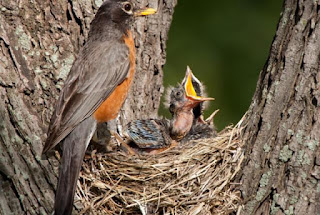Response Of a Bird Mother, When You Touch Their Baby
When I was a child, our lounge opened out onto a back deck through an arrangement of Igboentryways. A pine tree remained over the deck, giving a home to endless flying creatures. Infant flying creatures would frequently tumble from their homes onto the deck, and would lie there crying in full perspective of my sibling and me as we sat on the floor sitting in front of the TV. Our folks dependably let us know that we ought to never endeavor to save these winged creatures, regardless of to what extent they were out on the deck, in light of the fact that our aroma would bring about their folks to reject and surrender them.
Some of these children would start acting responsibly and discover their way once again into the home. Some would get dragged off by neighborhood felines. A couple got culled off the deck by birds of prey (and, once, ate up as I viewed). Whatever happened to the flying creatures, however, my sibling and I obediently listened to our mom.
Nowadays, I feel awful about that. It turns out my mother is loaded with baloney.
Aroma of a Human
Flying creatures won't promptly surrender their young since they "smell people." For one thing, winged animals don't have an awesome feeling of smell. Their olfactory globules are little and basic contrasted with different creatures (in spite of the fact that this wasn't generally the case, and there are special cases to the standard, similar to the turkey vulture, gooney bird and kiwi), and they're not going to have the capacity to choose your fragrance from the various odors hitting their noses at any given minute.
Regardless of the fact that they could distinguish your aroma, and make a negative relationship with it, they're not simply going to up and take off. You wouldn't surrender your children and home at the primary indication of risk, okay? Regardless of the fact that you didn't love it is possible that all that much, you as of now experienced the inconvenience of painting the parlor and transforming each one of those grimy diapers, correct? Feathered creatures will settle on that same straightforward monetary choice. They've contributed a considerable measure of time and vitality in those infants and they're not going to surrender them to no end. Mess around with a home before the eggs are laid or before they bring forth, and a winged creature may re-settle somewhere else, yet once the children are in the photo, they're no push-overs.
Salvage Mission
In this way, my mom is clearly no ornithologist, and she's not your mother, so don't hesitate to overlook her recommendation. (Kind of. Give me a chance to clarify.)
There are two sorts of infant winged animals you're prone to experience on the ground: nestlings and juveniles. Nestlings are featherless or fluffy and are excessively youthful, making it impossible to leave the home. Youngsters have their quills and are mature enough to leave the home and be on the ground, making their first intense strides far from home under the careful gaze of mother and father.
Juveniles you ought to take off alone. They'll normally lounge around for a couple days outside the home before their flight abilities grow enough that they needn't bother with their folks. On the off chance that you have a juvenile close to your home and are stressed over predators, request that your neighbors keep their felines inside. Birds of prey? All things considered, that is only the circle of life.
Nestlings, however, could most likely utilize some assistance. Lift them up and put them pack in the home, and their folks won't think any less of them on the off chance that they notice a tiny bit like a human. What you ought not do is take the little folks inside and attempt to look after them yourself. Indeed, you're at the highest point of the natural pecking order. You're keen and edified and have territory over the common world. Be that as it may, you are not a flying creature. You will make a lousy winged creature mother.



No comments:
Write comments